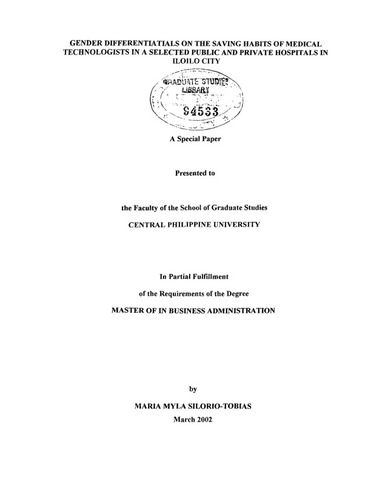| dc.description.abstract | Background and Rationale of the Study
When individuals with fixed-income are asked if they allot a regular portion of their income to savings in the form of cash or savings deposit, most usually say “no” because what they earn is sometimes not sufficient enough to meet their needs due to the rising prices.
Based on the data from the National Statistics Office, on the average, the annual income and the average annual expenditure by region, Region VI has a declining annual savings rate. Statistics show a savings rate of only 10 percent in 1991 and 9 percent in 1994. Estanislao, (1974) noted that personal savings rate in the national level is trending downwards.
The essence of savings can be best appreciated when there are situations that will arise and the immediate need for money is involved. Unexpected expenses that might be incurred by a family, such as those for medication in case of accident and sudden illness; hospitalization; school fees and contributions for extra-curricular activities of children, sudden death, and other expenses, such as household repairs and maintenance spell out the need for money.
Extra money in the form of savings can meet these needs, if indeed there is a regular saving even if the amount is small, for it can serve as a cushion against hardship on “rainy days.”
There are factors that influence the savings capacity of individuals with fixed- income. The spiraling increase in the prices of goods and services in times of inflation increases personal expenditures, leaving a little savings and if not checked, will eventually deplete the income, leaving no savings at all which then will result to credit. Others say that easy access to credit cards usage, enhances spending rather than savings. Family upbringing as to the utilization of money can influence an individual on his spending or saving habits.
When anyone receives an income, there are only two things to do, totally spend it or save a portion of it. Saving means income exceeds consumption or expenditure. Consumption by means of spending the income is always attractive; it gives immediate satisfaction whereas savings mean delaying consumption and satisfaction.
Saving, like losing weight, is one of the goals constantly testing one’s will power. One must admit that it is definitely more fun and easier to spend, than to save money, but savings for the rainy day or even for the sunnier day is necessary. It is a good habit.
Savings are important as a reserve for emergency needs, for payment of medical expenses, to pay for a vacation, to own a house, to build up capital for business, to grab opportunities, like buying at discounted prices, to supplement the retirement income, to become independent, to leave something to heirs, to get out of debt, to avoid the use of credit cards, and in the long run, if the individual will prosper through savings, he can reach out and give to churches, charities and others in need. Whether people save nor not and if they do, how much can they save is a question often asked. Various answers have been offered as to why people don’t save. Information on savings, however, is scarce, since there are very limited studies on this subject. It is for this reason that this study was conducted.
General Objective
This study was conducted to determine the gender differentials on saving habits among the Medical Technologists employed in the private and public hospitals in Iloilo City. The study further aims to determine whether saving habits vary according to sex.
Specific Objectives
Specifically, this study intends to:
1. Describe the characteristics of the respondents in terms of gender, age, civil status, family size, income, family type, attitudes, other sources of income and influence of parents.
2. Determine the saving habits of the respondents when they are classified into sex, age, civil status, family type, attitudes, other sources of income, and influence of parents.
3. Find out the difference in proportion of male and female who save regularly and their different methods or habits of saving.
4. Determine the percentage of monthly income saved by the male and female respondents.
5. Determine the reasons for saving and saving priorities of the respondents. | en_US |


